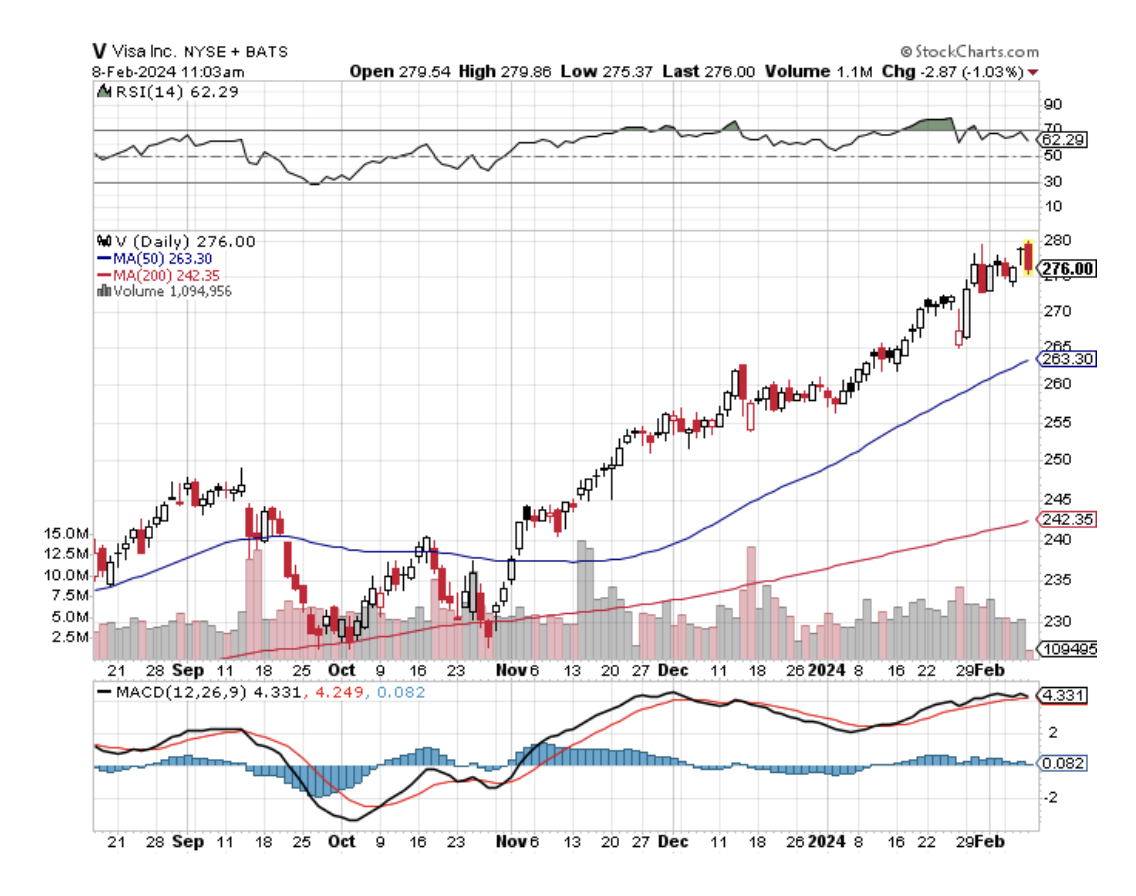A Note on Assigned Options, or Options Called Away
I was awoken this morning by calls from Concierge members asking what to do when their Visa (V) options were assigned or called away. The answer was very simple: fall down on your knees and thank your lucky stars. You have just made the maximum possible profit for your position instantly.
We have the good fortune to have five option call spreads that are deep in the money going into the February 16 option expiration. They include:
(MSFT) 2/$330-$340 call spread
(AMZN) 2/$130-$135 call spread
(V) 2/$240-$250 call spread
(PANW) 2/$260-$270 call spread
(CCJ) 2/$38-$41 call spread
In the run-up to every options expiration, which is the third Friday of every month, there is a possibility that any short options positions you have may get assigned or called away.
Most of you have short-option positions, although you may not realize it. For when you buy an in-the-money vertical option spread, it contains two elements: a long option and a short option.
The short options can get “assigned,” or “called away” at any time, as it is owned by a third party, the one you initially sold the put option to when you initiated the position.
You have to be careful here because the inexperienced can blow their newfound windfall if they take the wrong action, so here’s how to handle it correctly.
Let’s say you get an email from your broker telling you that your call options have been assigned away. I’ll use the example of the Visa (V) February 2024 $240-$250 in-the-money vertical BULL CALL debit spread.
For what the broker had done in effect allows you to get out of your call spread position at the maximum profit point 8 trading days before the February 16 expiration date. In other words, what you bought for $8.80 on January 10 is now $10.00!
All have to do is call your broker and instruct them to exercise your long position in your (V) February 2024 $240 calls to close out your short position in the (V) February 2024 $250 calls.
This is a perfectly hedged position, with both options having the same expiration date, and the same amount of contracts in the same stock, so there is no risk. The name, number of shares, and number of contracts are all identical, so you have no exposure at all.
Calls are a right to buy shares at a fixed price before a fixed date, and one option contract is exercisable into 100 shares.
To say it another way, you bought the (V) at $240 and sold it at $250, paid $8.80 for the right to do so, so your profit is $1.20 or ($1.20 X 100 shares X 12 contracts) = $1,440. Not bad for a 26-day defined limited-risk play.
Sounds like a good trade to me.
Weird stuff like this happens in the run-up to options expirations like we have coming.
A call owner may need to buy a long (V) position after the close, and exercising his long February $240 call is the only way to execute it.
Adequate shares may not be available in the market, or maybe a limit order didn’t get done by the market close.
There are thousands of algorithms out there that may arrive at some twisted logic that the calls need to be exercised.
Many require a rebalancing of hedges at the close every day which can be achieved through option exercises.
And yes, options even get exercised by accident. There are still a few humans left in this market to make mistakes.
And here’s another possible outcome in this process.
Your broker will call you to notify you of an option called away, and then give you the wrong advice on what to do about it. They’ll tell you to take delivery of your long stock and then most additional margin to cover the risk.
Either that, or you can just sell your shares on the following Monday and take on a ton of risk over the weekend. This generates oodles of commission for the brokers but impoverishes you.
There may not even be an evil motive behind the bad advice. Brokers are not investing a lot in training staff these days. It doesn’t pay. In fact, I think I’m the last one they did train 50 years ago.
Avarice could have been an explanation here but I think stupidity, poor training, and low wages are much more likely.
Brokers have so many legal ways to steal money that they don’t need to resort to the illegal kind.
This exercise process is now fully automated at most brokers but it never hurts to follow up with a phone call if you get an exercise notice. Mistakes do happen.
Some may also send you a link to a video of what to do about all this.
If any of you are the slightest bit worried or confused by all of this, come out of your position RIGHT NOW at a small profit! You should never be worried or confused about any position tying up YOUR money.
Professionals do these things all day long and exercises become second nature, just another cost of doing business.
If you do this long enough, eventually you get hit. I bet you don’t.
Calling All Options!



